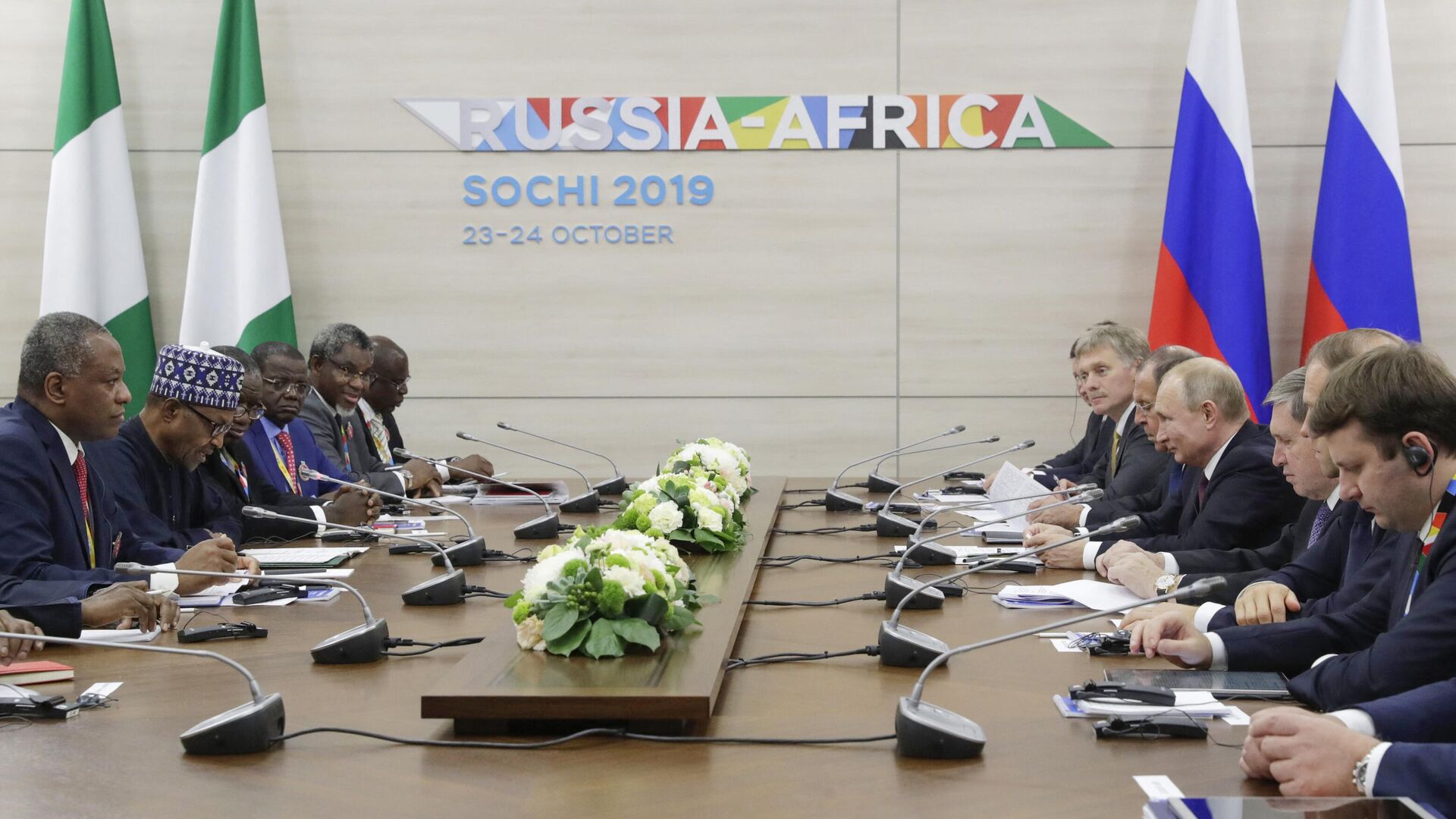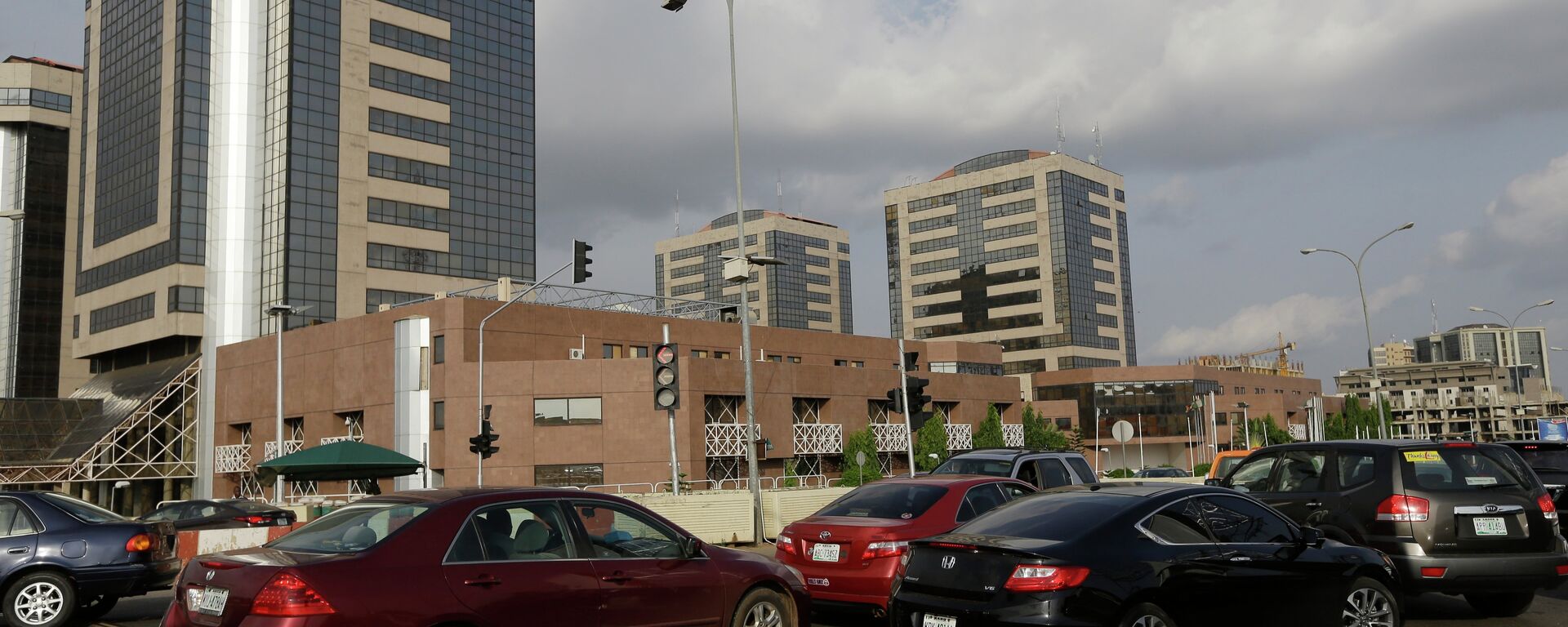https://en.sputniknews.africa/20230529/formidable-engagement-synergy-between-russia--africa-needed-nigerian-ceo-states-1059543815.html
'Formidable Engagement Synergy' Between Russia & Africa Needed, Nigerian CEO States
'Formidable Engagement Synergy' Between Russia & Africa Needed, Nigerian CEO States
Sputnik Africa
Despite the inherent challenges associated with global politics, it is essential to build bridges and create a "formidable engagement synergy" between Russia and African countries, including Nigeria, Adekunle Patrick Adedeji said.
2023-05-29T18:37+0200
2023-05-29T18:37+0200
2023-08-03T10:44+0200
sub-saharan africa
west africa
nigeria
russia
russia-africa cooperation
cooperation
economic growth
interview
africa in details
economy
https://cdn1.img.sputniknews.africa/img/07e7/05/1d/1059575199_0:117:3121:1872_1920x0_80_0_0_380c1d516ab0ef3eba425b85e19c55aa.jpg
Despite the inherent challenges associated with global politics, it is essential to build bridges and create a "formidable engagement synergy" between Russia and African countries, including Nigeria, the continent's top oil producer, Patrick Adedeji Adekunle, CEO of the Nigerian company Fitzpatrick Energy and Logistics Ltd., told Sputnik Africa in an interview.Highlighting the importance of building strong relationships between Russia, his country, and other African nations, Adekunle emphasized that Russia is a great nation with much to offer African countries.Adekunle acknowledged that there are political challenges in the global oil industry, but stressed the importance of building relationships based on mutual benefit. He argued that his background as a civil engineer gives him a unique perspective on the value of infrastructure projects, and he recognizes the potential of mutually beneficial partnerships and initiatives that can drive progress.The Nigerian CEO believes that working together and leveraging each country's strengths is the key to success in the high-tech field, pointing out that no one country or individual has a monopoly on wisdom or intellectual capacity.Adekunle acknowledged that Western sanctions may affect technology, but emphasized that through working together, Africa and Russia could diversify the high-tech field and lessen dependence on other countries.Adekunle emphasized that "when there's synergy, there's peace, there's coordination, there's commitment, there's nothing you can't achieve."While acknowledging that African countries such as Nigeria are facing a common challenge of balancing the public and private sectors in the drive for sustainable economic development, the CEO of Fitzpatrick Energy and Logistics Ltd, shared his belief that private sector-driven economies are the key to success.Patrick Adedeji added that the state should focus on creating an environment that enables the private sector to drive the economy and bring in its capital and expertise "in conjunction with all the partners from Russia," as well as from other countries. By doing so, the private sector can operate under guidelines set by the government and foster economic growth.The CEO pointed out that agriculture is a significant potential growth opportunity for Nigeria. However, logistical challenges have hindered the sector's progress. There is a need for private sector involvement in developing critical infrastructure, such as railways and roads, to support agricultural initiatives.Adekunle believes that the private sector has the power to build the bureaucratic guidance and institutional programs necessary to drive agricultural projects forward. Vigilant project management and monitoring are also essential. With government support and partnership, the Nigerian private sector can build the infrastructure needed to transform agriculture in Africa and make it a global player.As Nigeria, a country of over 200 million people, embarks on this task, it will need international cooperation to address the security challenges that could otherwise impede progress and cause agricultural produce to perish along the way, Adekunle said. By building a sustainable, private sector-driven economy, Nigeria can contribute its formidable human capital and resources to the world and become a self-sufficient agricultural hub that can feed not only its people, but the entire African continent.
https://en.sputniknews.africa/20230525/nigerian-commodities-exchange-plans-to-expand-to-seven-african-countries-1059475584.html
https://en.sputniknews.africa/20230529/video-nigeria-gets-own-airline-as-first-plane-revs-up-for-business-1059566879.html
west africa
nigeria
russia
Sputnik Africa
feedback@sputniknews.com
+74956456601
MIA „Rossiya Segodnya“
2023
Muhammad Nooh Osman
https://cdn1.img.sputniknews.africa/img/07e7/04/0a/1058467512_0:0:1280:1280_100x100_80_0_0_ec723833bcbfcaed2e21952965ad99e4.jpg
Muhammad Nooh Osman
https://cdn1.img.sputniknews.africa/img/07e7/04/0a/1058467512_0:0:1280:1280_100x100_80_0_0_ec723833bcbfcaed2e21952965ad99e4.jpg
News
en_EN
Sputnik Africa
feedback@sputniknews.com
+74956456601
MIA „Rossiya Segodnya“
Sputnik Africa
feedback@sputniknews.com
+74956456601
MIA „Rossiya Segodnya“
Muhammad Nooh Osman
https://cdn1.img.sputniknews.africa/img/07e7/04/0a/1058467512_0:0:1280:1280_100x100_80_0_0_ec723833bcbfcaed2e21952965ad99e4.jpg
russia, africa, can africa, russia shape new reality on global stage together?, russia africa cooperation, africa development, africa oil, africa business, moscow export day, moscow export center, nigeria, russian-nigerian relations, russian-nigerian cooperation, cooperation,
russia, africa, can africa, russia shape new reality on global stage together?, russia africa cooperation, africa development, africa oil, africa business, moscow export day, moscow export center, nigeria, russian-nigerian relations, russian-nigerian cooperation, cooperation,
'Formidable Engagement Synergy' Between Russia & Africa Needed, Nigerian CEO States
18:37 29.05.2023 (Updated: 10:44 03.08.2023) Muhammad Nooh Osman
Writer/Editor
Exclusive
On the occasion of last week's Moscow Export Day forum for export-oriented businesses, hosted by the Moscow Export Center, Sputnik Africa spoke with a group of visiting African business leaders and officials about the prospects for Africa's development and Russian-African cooperation.
Despite the inherent challenges associated with global politics, it is essential to build bridges and create a "formidable engagement synergy" between Russia and African countries, including Nigeria, the continent's top oil producer,
Patrick Adedeji Adekunle, CEO of the Nigerian company Fitzpatrick Energy and Logistics Ltd., told
Sputnik Africa in an
interview.
Highlighting the importance of building strong relationships between Russia, his country, and other African nations, Adekunle emphasized that Russia is a great nation with much to offer African countries.
"Like you know, Nigeria is the seventh-largest producer of crude oil on the global stage and of course, Russia is the second. Now there's a need for us to build a formidable engagement synergy to be able to actualize our dream," said Adekunle. "Russia is a great nation, is a superpower. We have a lot to learn from you. You have a lot to learn from us as well. Like I said, synergy."
Adekunle acknowledged that there are political challenges in the global oil industry, but stressed the importance of building relationships based on mutual benefit. He argued that his background as a civil engineer gives him a unique perspective on the value of infrastructure projects, and he recognizes the potential of mutually beneficial partnerships and initiatives that can drive progress.
The Nigerian CEO believes that working together and leveraging each country's strengths
is the key to success in the high-tech field, pointing out that no one country or individual has a monopoly on wisdom or intellectual capacity.
Just as in a family, Adekunle argued, coordination and commitment are critical to achieving goals.
Adekunle acknowledged that Western sanctions may affect technology, but emphasized that through working together, Africa and Russia could diversify the high-tech field and lessen dependence on other countries.
"The idea that one individual or one nation does it all is a fallacy. And my commitment to engagement is synergy. Synergy is critical to be able to achieve because everybody is bringing their core competencies to bear," he said. "And when you do that, you build a formidable enterprise, a formidable union."
Adekunle emphasized that "when there's synergy, there's peace, there's coordination, there's commitment, there's nothing you can't achieve."
"And where there's a will, there's always a goal. That said, this is an opportunity for Russia and African countries to come together and design and architecture to be able to drive this initiative with a new present reality that's on the global stage," Adekunle stated.
While acknowledging that African countries such as
Nigeria are facing a common challenge of balancing the public and private sectors in the drive for sustainable economic development, the CEO of Fitzpatrick Energy and Logistics Ltd, shared his belief that private sector-driven economies are the key to success.
"I'm a firm believer in a private sector-driven economy with the state regulating it. In Nigeria, the state has done most of the business in the past, and I hate to say this, we haven't got a good result. I keep saying it in different forums. The government has no business in business," he said.
Patrick Adedeji added that the state should focus on creating an environment that enables the private sector to drive the economy and bring in its capital and expertise "in conjunction with all the partners from Russia," as well as from other countries. By doing so, the private sector can operate under guidelines set by the government and foster economic growth.
The CEO pointed out that agriculture is a significant potential growth opportunity for Nigeria. However, logistical challenges have hindered the sector's progress. There is a need for private sector involvement in developing critical infrastructure, such as railways and roads, to support agricultural initiatives.
"And the major challenge for most firms is the challenge of logistics. Moving the item from the rural areas to the urban areas. That's why 70% of most of the products perish in between, which is unfortunate," Adekunle said.
Adekunle believes that the private sector
has the power to build the bureaucratic guidance and institutional programs necessary to drive agricultural projects forward. Vigilant project management and monitoring are also essential. With government support and partnership, the Nigerian private sector can build the infrastructure needed to transform agriculture in Africa and make it a global player.
As Nigeria, a country of over 200 million people, embarks on this task, it will need international cooperation to address the security challenges that could otherwise impede progress and cause agricultural produce to perish along the way, Adekunle said. By building a sustainable, private sector-driven economy, Nigeria can contribute its formidable human capital and resources to the world and become a self-sufficient agricultural hub that can feed not only its people, but the entire African continent.
"Nigeria is one of the most formidable human capital resources in the world," Adekunle concluded. "So give me a base of support and I will shake the world, give Nigeria all the necessary backup. Nigerians are very enterprising, and we want to contribute our own quota to the global community [...] with our partners, in partnership with Russia."
Adekunle Patrick Adedeji
CEO of Fitzpatrick Energy and Logistics Ltd.




